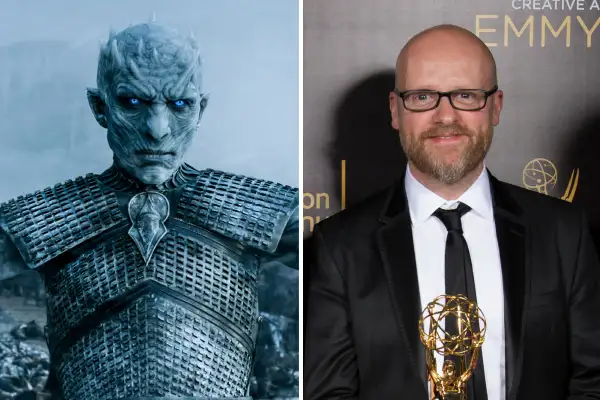Meet the ‘Game of Thrones’ Prosthetics Wizard Who Makes the Night King Come Alive

As the Night King grew his army, so did Barrie Gower.
For the past five years, Gower has been a prosthetics designer and supervisor on Game of Thrones, where he has outfitted the Army of the Dead, designed the mysterious Night King, and made the affecting Children of the Forest a reality. It’s a job that grew increasingly essential to the show’s storylines — particularly for the final season of the HBO series, which is expected to display the long-awaited battle between the living and the dead.
Back when he first joined the HBO series in 2014, Gower's work focused on just six White Walkers. But in the show’s last few seasons, he managed a team of about 70 to 80 people on set, spending weeks crafting prosthetics for characters and working more than 15 hours a day to apply prosthetics, remove them, and stand by for any necessary fixes on set.
“Game of Thrones is undoubtedly the toughest project I’ve ever worked on,” Gower tells Money. “Each season has grown and grown, but on average, we had hundreds of makeups and gags to do each year.”
“The workload has had us in tears at times,” Gower says, “but also has been the best experience of my career.”
It’s a daunting and time-consuming profession, to say the least. Simply making the prosthetics for characters like the Night King takes between three to four weeks, he says, and requires creating molds of the actors, designing the prosthetics themselves, and creating duplicates. On set, designers can show up as early as 1 a.m. to apply the prosthetics and make-up to actors, and end up working until the evening.
“Our team would work in shifts and try to grab naps whenever possible,” Gower says.
Gower declined to give specifics on the Game of Thrones production budget for prosthetics and salaries of the designers on set. But, as the designer suggests, the series has grown in size and production scale each year. The total cost for its final season was reportedly $15 million per episode — a significant jump from the reported $6 million per episode the show spent in its first season.
Outside of his time spent in Westeros, Gower and his wife Sarah manage their own prosthetic make-up design company, BGFX. With more than 20 years of experience in the field, Gower's work goes well beyond the Game of Thrones universe. His prosthetics have been featured in everything from the Harry Potter franchise to Meryl Streep's transformation in The Iron Lady.
Inspired as a high schooler by the designs for Ridley Scott's Alien, Gower's main focus is on monsters and creepy creatures. He worked as a freelance artist for years before starting his own company and found himself in more of a managerial role on Game of Thrones as the show's storylines developed.
As his role expanded on the show, he learned a valuable leadership lesson.
“If you treat people properly — speak to them how you would expect to be spoken to yourself — you really get the best out of people,” Gower says. “Your crew thrives when they know they’ve done a good job, so it’s always important to give credit where it’s due.”
“Heading your own team and being the decision maker brings a lot of responsibility,” Gower adds. “It is incredibly rewarding, but I also long to get back to the bench and get stuck into a sculpture.”
Gower and his team have won three Emmys for their prosthetic work on Game of Thrones. Those awards specifically honored episodes that featured the mystical Children of the Forest, Hodor’s devastating death, and season seven’s finale in which (spoiler alert!) the Night King, his army, and un-dead dragon destroy the Wall.
Gower says his team’s work really “exploded” in the show during its fifth season’s memorable “Hardhome” episode, the first close look at the White Walkers and their army. The scene itself took a full month to shoot and, due to its slew of grotesque zombie-like characters, upped the ante on what was needed in terms of prosthetics and make-up. “An average make-up day would start around 3 a.m. We would film from approximately 8 a.m. to 6 p.m., de-rig the actors out of their make-ups, and leave around 7 p.m.,” Gower says.
Another stand-out moment for Gower: Samwell Tarly’s gruesome removal of Jorah Mormont’s grayscale in season seven. That “was a personal favorite,” Gower says.
But his most notable work for the series as a whole? “Maybe ask me again in about six weeks after the finale has aired,” he says.